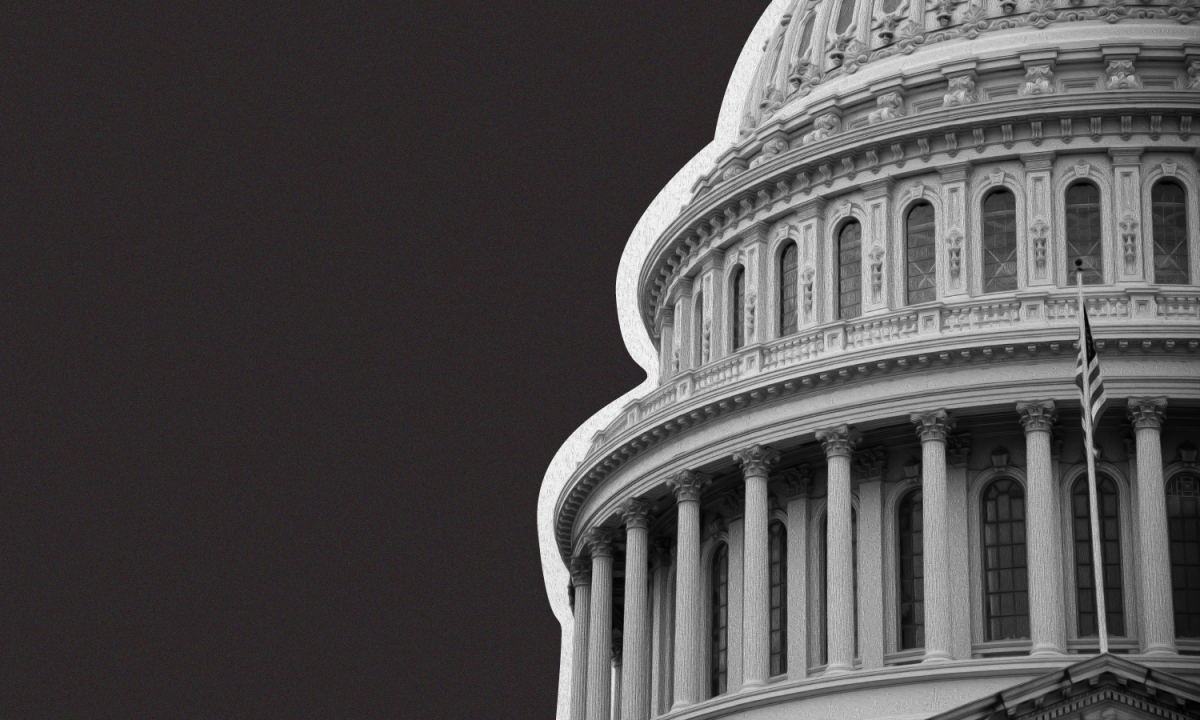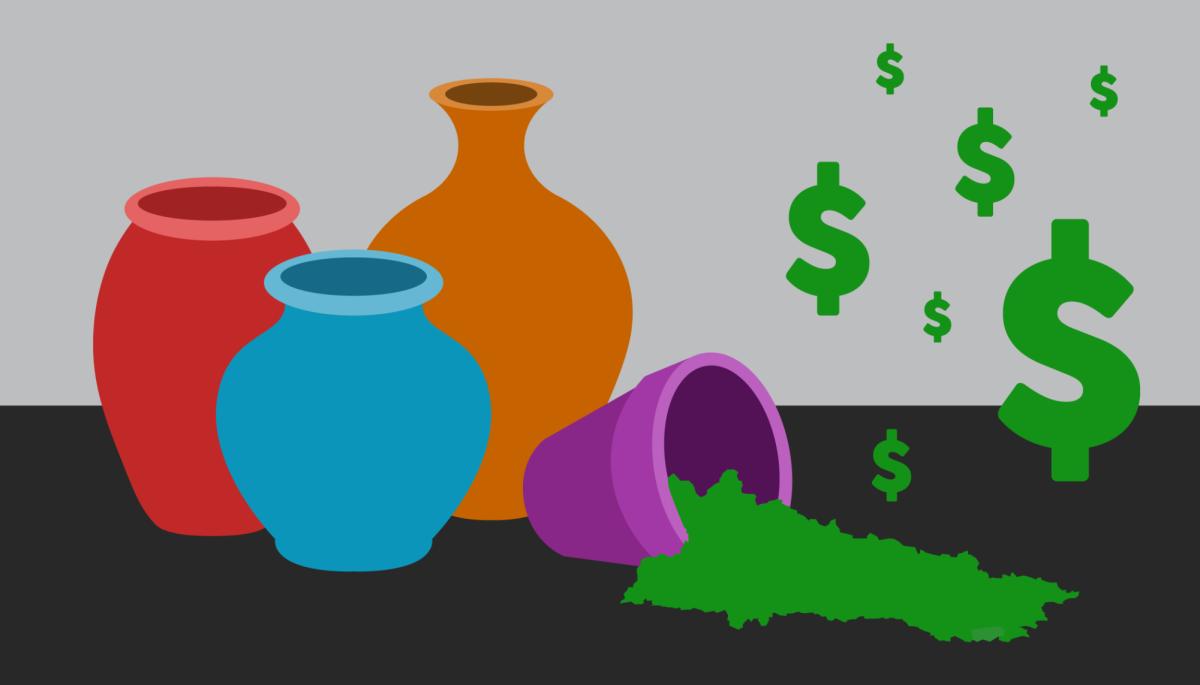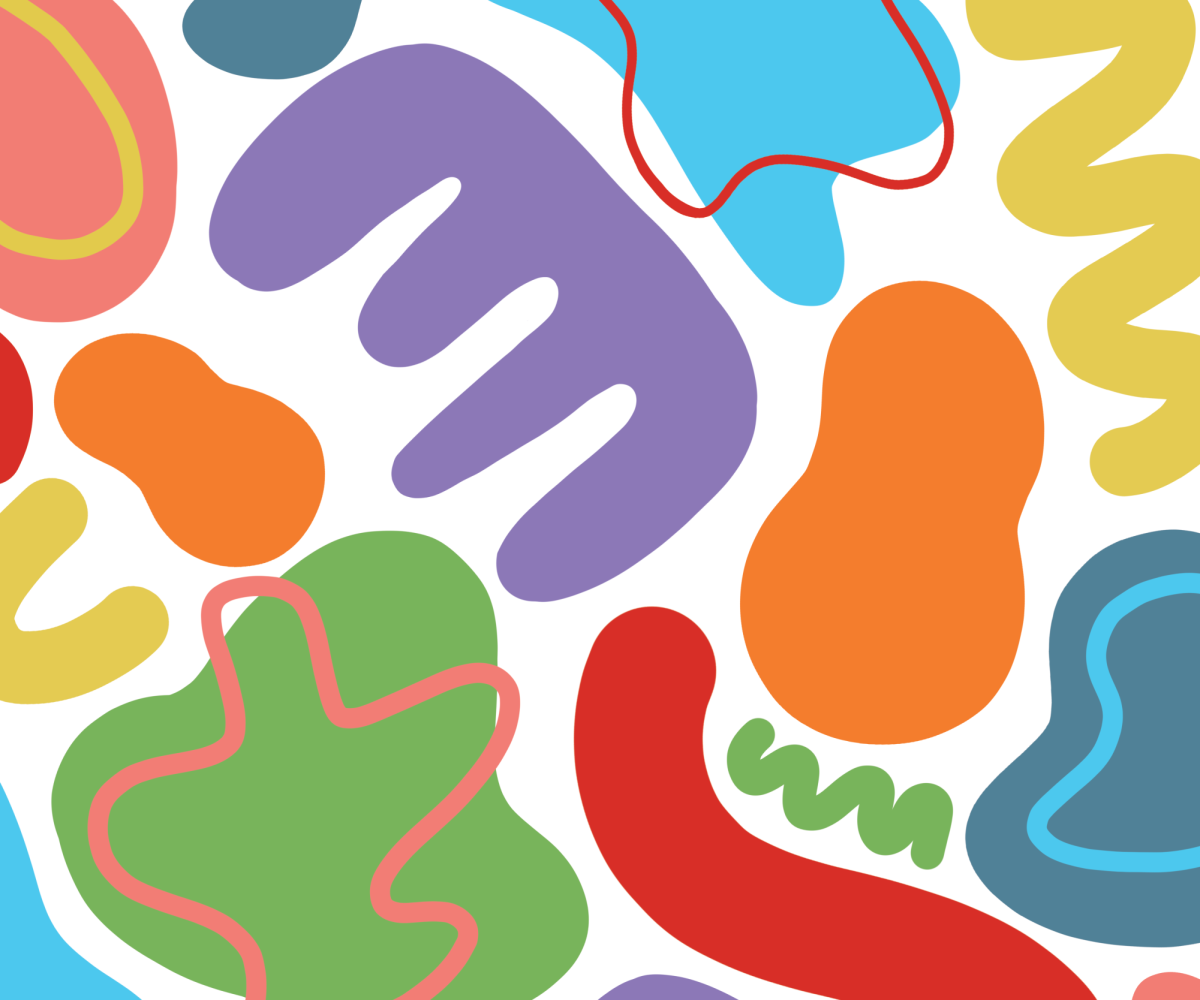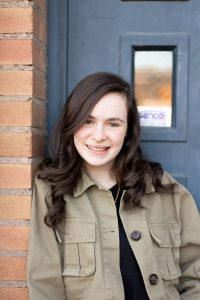In the 2018-2019 academic year, the University of Utah was ranked one of the top LGBTQ-friendly colleges in the US. The survey — conducted by Affordable Colleges Online — ranked the U second behind UC Riverside due to its mental health resources, LGBT Resource Center, inclusive housing, and affirmative statements. Yet some queer students feel this does not reflect their experience.
For this story, 67 students, faculty, or staff at the U identifying as members of the LGBTQ+ community filled out a survey on their thoughts about the U’s policies and resources, as well as the level of safety they feel on campus. These respondents will remain anonymous.
University of Utah’s Queer Community
Part of the LGBTQ+ community on campus feels unsafe publicly displaying their gender and/or sexual expression. Survey results showed that 32 percent of queer-identifying respondents answered “no” when asked if they felt comfortable engaging in public displays of affection while on campus.
When asked if they felt comfortable engaging in public displays of affection specifically in a non-heterosexual relationship, 50 percent answered “no.”
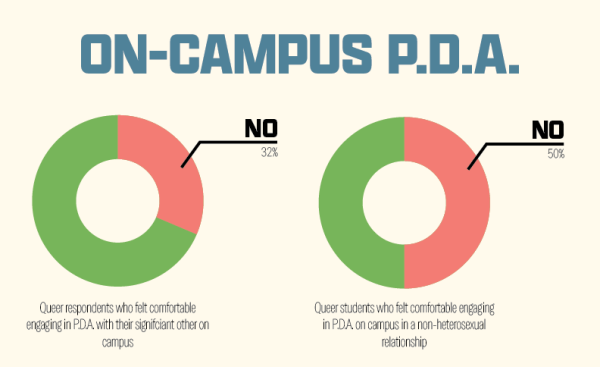
Students also worry about experiencing “hate crimes or harassment” due to their sexuality. One student elaborated on this, saying they are fearful about experiencing “everything from safety threats with physical violence and intimidation to subtle things like microaggressions.”
Queer students were asked to rank how easy it was for them to make friends of a similar sexuality on a scale of one to five, with one being very easy, and five being very difficult. The most common answer was four, and the average of all responses was 2.44. For straight students who took the survey, the most common answer was one, and 2.39 was the average.
Students were also asked to rank how easy it was for them to make friends of a similar gender identity on the same scale: one being very easy, and five being very difficult. For cisgender students, the most common answer was one, and the average was 2.40. For students who identified as trans, which included 12 survey respondents, the most common answer was two, and the average was 2.49. For students who identified as non-binary, which included 16 survey respondents, the most common number was four and the average was 2.80.
When asked how easy it is to find romantic/sexual partners with people of a similar sexuality on this scale, most queer students ranked it as a three. The average was 3.25.
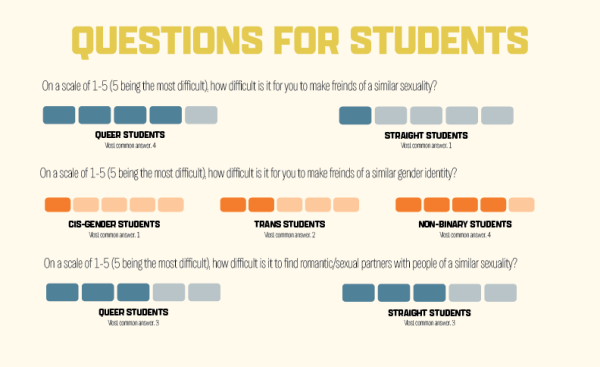
As a whole, the queer community seemed concerned for their transgender members.
One survey respondent said they “have a lot of concerns about the usage and respect of pronouns and transgender students.”
A separate student expressed a similar sentiment, saying their “pronouns were never respected.”
On top of pronouns, another issue some people brought up was bathroom access. One individual said, “I would love to see gender-free bathrooms make an appearance at some point.”
One trans student said they would like to be able to have more friends with a similar identity to them so they would feel safer in spaces they don’t typically feel welcome in. The student mentioned the student life center as an example.
Some students felt that although homophobia may be decreasing, transphobia is not.
LGBTQ+ Resources on Campus
The University of Utah provides a few different resources for queer-identifying students on campus.
During pride month, the U participates in the Utah Pride Parade, bringing along students, the mascot Swoop, the spirit team, faculty, and other university-affiliated members.
For Pride Week, the U wraps the Block U in a pride flag-themed wrap to give visibility to queer students. They also link this image to the Equity, Diversity, and Inclusion website where students can find events the university will be hosting during Pride Week.
The U’s social media page posts images of their support and efforts to promote the inclusivity of the LGBTQ+ community.
When there are no Pride events happening, the U offers students the ability to use the LGBT Resource Center.
The LGBT Resource Center describes its mission as “empower[ing] lesbian, gay, bisexual, transgender, queer, questioning, intersex, asexual/aromantic (LGBTQIA+) students to grow as leaders and learners by supporting students in navigating university systems, exploring their identities, finding community, and developing as leaders with a social justice lens.”
The center offers multiple resources, with some of those being events to promote connection among members of the community.
One of these is Fab Friday, an opportunity for all students to “come play games, meet new people, and bask in each other’s company and fierceness to wrap up the week.”
Other events include “big Q-T welcomes,” “Gay-La and Silent Auction,” and “Lavender Graduation.”
The center has a discord for students who do not want to attend in person. The discord server lets students join to “chat with other students, get to know our staff, answer the weekly whiteboard question, and keep up to date with the program’s events.”
The website also links to different resources like tutors, mental health access, the Office of Equal Opportunity, food pantries, and student success advocates.
For trans students specifically, the LGBT Resource Center provides information on how to change your name and/or gender on Canvas, CIS, your Ucard, and the registrar’s office.
The center also explicitly states that their work “is not about creating more acceptance of LGBTQIA+ students on campus, but rather a celebration of LGBTQIA+ lives in all their diversity.” They continue the statement by saying they “believe that LGBTQIA+ people make our campus and our world a better place and that we need to honor the contributions of queer and trans people.”
The Daily Utah Chronicle interviewed students about their usage of the resources offered by the U. The survey showed that 92 percent of students were aware of the LGBT Resource Center before filling out the form and that 99 percent of students identifying as queer were aware of it.
The survey also showed that 28 percent of survey respondents had used the resource center before. This number increases to 39 percent for survey respondents who identified as queer.
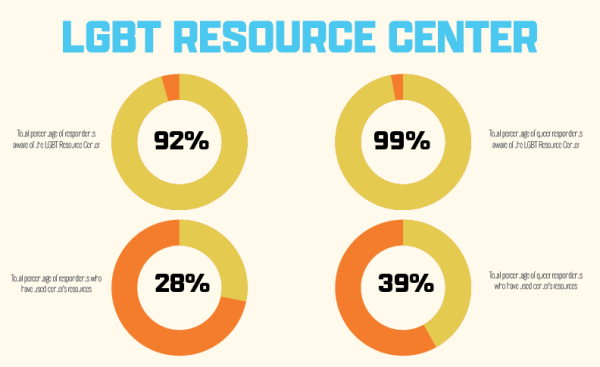
Queer students who reported utilizing the center described using it for different purposes. Some uses mentioned by students included: free printing, changing their name and pronouns, a quiet place to study, LGBTQ books, discovering resources, or having a moment away from the school environment.
The most common answer, mentioned by 15 students, was “socializing.” Students used it “to meet other members of the LGBTQ community,” to find “community” and “support,” and to attend the program’s Fab Fridays, which four students said they had attended. One student said they attended an “aro/ace meetup” at the center and another said they attended “Beyond Binaries,” a support group for trans/nonbinary students.
One queer student said that the “LGBTQ Resource Center is doing great work … they are awesome.”
Some students felt the U offers some resources for queer students, but not enough. One complaint by a student is that “counseling is really important for queer students,” but that it is “often difficult for them to access due to the waitlist.”
Many queer students are grateful to have the LGBT Resource Center but emphasize that this isn’t the only place students should have to feel safe.
“Every place on campus should be safe for queer people, and every space should have them,” one student commented.
Performative Activism?
The survey sent out to the University of Utah community asked how respondents felt about the school’s support of the LGBTQ+ community. 31 percent of queer survey respondents felt that the U engages in performative activism.
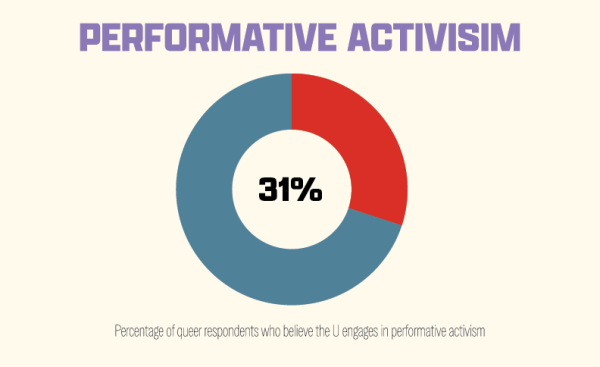
Performative Activism is defined as “a critical label that is applied to instances of shallow or self-serving support for social justice causes.”
This term is used to describe people, businesses, and institutions that will sometimes attempt to appear inclusive for their own interest and benefit, but continue to make decisions and take actions that harm marginalized communities.
During Pride Week 2023, an incident of hate and bias was reported to the university’s Office of Equal Opportunity. This incident was the hanging of flyers advertising YAF’s anti-trans film.
The U’s diversity website posted a statement, admitting that the flyers were “offensive,” but that “although the flyer featured an offensive illustration of trans people, offensive speech is still protected by the First Amendment.”
The statement also acknowledges that it was done by a “Recognized Student Organization,” but that “the university respects the free speech rights of all university groups/members… [and] encourages members of the campus community to express their views in the most respectful way possible.”
Some LGBTQ+ members felt the U should have taken action in response to this incident.
“I think there should be harsher repercussions for those engaging in discrimination,” one survey respondent said.
Another survey respondent expressed dissatisfaction about the incident, saying “The U is not doing anything to protect us from this group or to stop the group from advertising/congregating on campus.”
A third student discussed the U’s lack of engagement with local politics.
“Is the U doing anything to press the legislature to protect us [queer students]?” the student asked. “If the U wanted to stand up for us it could. That is a choice. We see when leadership chooses to be silent or apprehensive.”
Some students felt the U engages in performative activism because their support for queer students is expressed only during scheduled programming.
“It seems as though the only time they really do anything is around pride month,” one student said.
Groups on Campus
Not all campus settings have the same amount of inclusivity towards members of the LGBTQ+ community, some students expressed.
According to survey responses, some queer students feel that the lack of safety to engage in sexual and gender expression stems from different groups on campus.
One queer student remarked that “there are some groups who express some dislike and hate towards the queer community.”
Another student wrote that “certain U groups are ignorant and sometimes exclusive and hateful toward queer students.”
They also named some of the specific groups they felt expressed this exclusivity.
“I’m thinking of Greek life groups, but specifically the YAF [Young Americans for Freedom] Utah group, which is transphobic and homophobic,” the student said.“ [They] make queer students like myself feel unsafe”.
This is not the first time queer students have felt threatened by YAF for Utah on campus. The Chronicle previously reported on an event held by the group where they spoke against “LGBTQ indoctrination” and were met with protests from queer students.
YAF was also met with backlash when they held a watch party for an anti-trans film during the U’s celebration of Pride Week in April 2023. They were met with backlash again at another watch party of the film held on Nov. 1, 2023, which was disrupted by around 50 protestors.
Another student said one of their concerns as a queer student is “reactionary groups like TP USA [Turning Point USA], YAF, etc., making campus unsafe.” A different queer student agreed, stating that “homophobic and transphobic organizations on campus such as TP USA and YAF” make them feel unsafe on campus.
They added that they are also “afraid of Greek life groups on campus, especially frats, given their reputation for sexual assault and bullying.” Other queer members agree that some of their safety concerns come from the presence of Greek life, with another student mentioning the “homophobia in fraternities” as something they worry about.
The exclusion of members of the LGBTQ+ community is not limited to political groups and Greek life organizations with some queer students saying it’s also an issue in the classroom.
“The acceptance of queer students varies by department,” one survey respondent said.
Many respondents remarked how classes in different colleges have various levels of acceptance. One student is worried about their “safety in non-arts/humanities classrooms,” mentioning how some classes that do not fall under the humanities category are not as accepting. Another survey respondent said that they “don’t feel safe in being open[ly queer] in the business building or the business department’s activities, but do feel safe in the art building, for example.”
This is something that multiple queer students discussed in the survey. One student provided a personal anecdote, claiming that “the School of Computing MSD program reinforces a gender binary and sexism,” and expressing disappointment that “there are no female or non-binary identified faculty in the program [they’re] in.”
Similar issues happen on the medical campus, according to one survey respondent.
“There is such a resistance/disconnect with older individuals to respect pronouns and identity – especially on the medical campus,” the respondent said.
Another student stated that gender-biased language is the standard for classes and professors, and pronouns aren’t always respected.
Acceptance Off-Campus
The concern for queer safety is not a campus-only issue. Queer students feel like their safety off campus is at risk as well.
Some people believe that the environment off campus negatively affects the U’s inclusivity. One student wrote in the survey that “the U is funded by a state government who is enacting laws that are anti-queer,” which silences faculty and staff.
“The university doesn’t have authoritative autonomy from the state legislature and doesn’t seem to have enough power to push back against bad directives,” a separate student said, referring to Utah’s anti-LGBTQ laws.
The U is a public university. This means that its funding and policies are largely controlled and influenced by state and local government. Utah’s education website states that “in Utah’s constitution, the powers to create and maintain the state’s education systems are found in Article X Section 1 and Article X Section 3, which give powers to the State Legislature and State Board of Education respectively.”
Another student made the connection to national politics as a whole, mentioning the “growing transphobia in the US” as part of their concern.
One student who was previously quoted in this article calls for “additional support given all of the anti-trans rhetoric and legislation” that happens in Utah. They state how they “haven’t seen anything that comes close to stressing how important it is that we protect our queer community.”
Utah is unique in its high population of people who are members of the Church of Jesus Christ of Latter-day Saints. Some queer students claim this contributes to their exclusion from the community. One student writes that their concern stems from the fact that “people of the dominant and empowered religion are unwelcoming,” referring to the LDS church.
A survey conducted by Pew Research Center in 2014 showed that 57% of these LDS church members believed that “homosexuality should be discouraged.” The same student also said that these people’s “belief that I [a queer person] am not going to qualify for heaven” makes them feel excluded.
In March 2023, thousands of students at Southern Utah University signed a petition to oppose the choice of LDS General Authority, Jeffrey R. Holland, as the keynote speaker at their graduation ceremony. This was due to a talk delivered by Holland in 2021 which encouraged members to use “muskets” to defend the church’s stance that marriage is between only a man and a woman.
According to some members of the LGBTQ community, this history of homophobia and anti-queer rhetoric is why they feel unwelcome in the heavily LDS community of Utah.
A Call to Action
According to the survey, only six percent of queer respondents believe the U is doing enough for members of their community. Queer students had various ideas for additional resources which could be provided by the U.
Eight students mentioned gender-neutral restrooms, with seven suggesting that more are needed on campus and one also mentioning the need for gender-neutral housing.
Five students discussed topics related to respecting pronouns and name changes. One of these students shared that the name change process is difficult and that they had to put in several IT tickets to get it done. Another student said making this process easier is important to ensure students can have the correct name on their degree.
Two students shared a need for help communicating with professors about their gender identity, one of them suggesting the creation of an email template that students could use to let professors know when they need time off for gender-affirming care.
Seven students said better access to mental health counseling and support groups is needed. One of these students requested counseling for Christian students specifically, saying there is a need for “solid Christian counseling with dedicated chaplains who understand what queer Christian students are going through.”
Four students said more resources are needed for those on the aromantic/asexual spectrum.
Eight students said they wished there were more social events organized for queer people on campus. Some of the events suggested included speed dating and art fairs.
One student suggested the LGBT Resource Center establish a free “gender-affirming closet,” including not only clothing but also items like “packers, chest plates, binders, etc.” The student said these items can be expensive and “many of our students would benefit from having those available.”
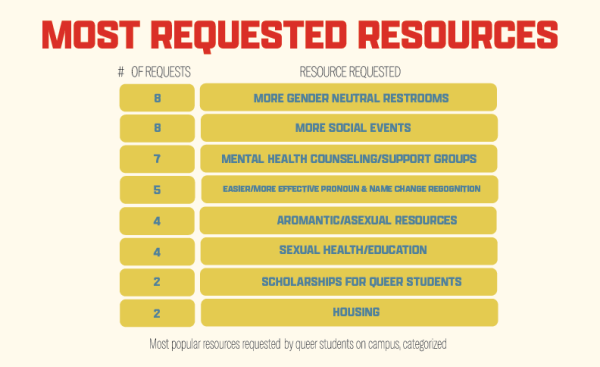
One student complained that “professors are relying on BIPOC [black and indigenous people of color]/Queer students to teach them and it isn’t the student’s job to do this.”
The solution, they say? Diversity training for students, faculty and staff, which one student said would “provide basic tangible steps as to how to create a more inclusive space and classroom.”
Another student also advocated for diversity training. They said the U should require “diversity classes for students and staff” as well as “education on sexuality and orientation.”
The destigmatization of the LGBTQ community is also important to students.
One student said they would “love to see us keep pushing pronoun-friendly spaces where introducing yourself with your name and pronouns is the norm.”
“It’s all fun and games to have a pride wrap on the BlockU,” one student said.“But the institution has lots of work to do to ensure that queer and trans students are actually receiving tangible benefits from the University beyond merch and rainbow capitalism.”







